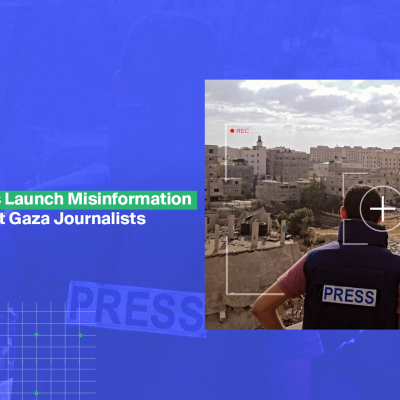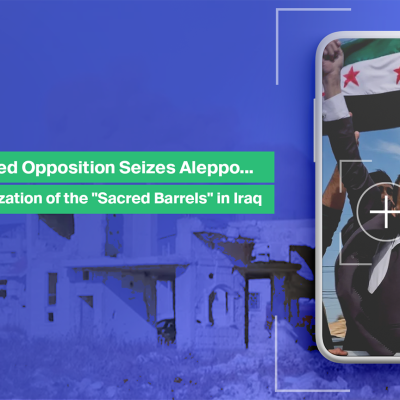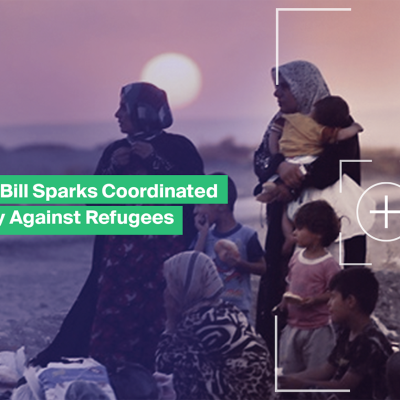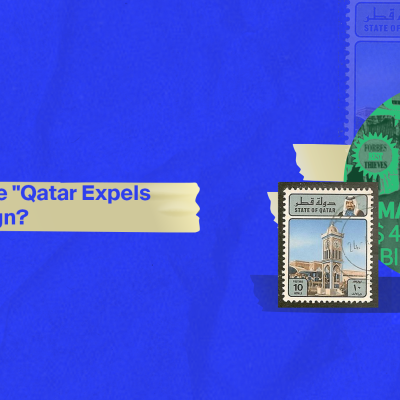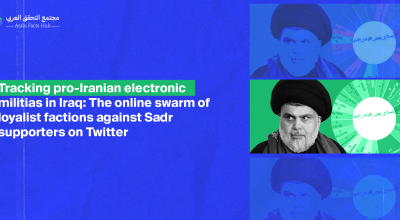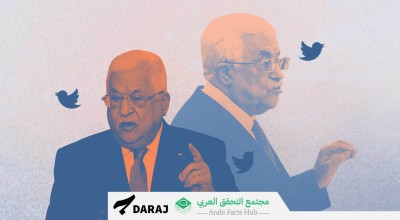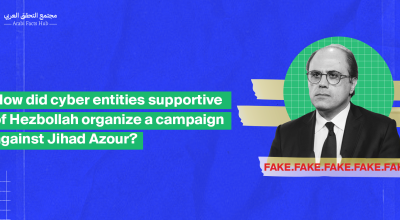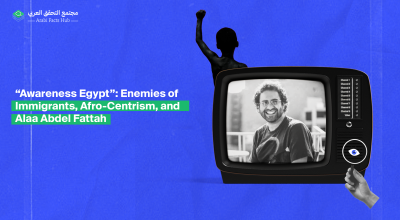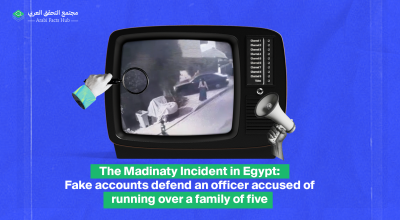"Basket Jihad": A Coordinated Hate Campaign Against Lebanese Female Refugees
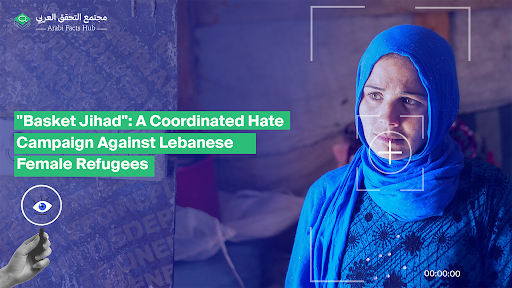
"Basket Jihad": A Coordinated Hate Campaign Against Lebanese Female Refugees
Amid the worsening crisis of displaced people from southern Lebanon due to the Israeli war, coordinated online activities have emerged promoting disinformation and gender-based hate speech against female refugees, accusing them of receiving food baskets in exchange for sex.
As the course of the war in Lebanon shifted in September 2024, hundreds of thousands of residents from the south began relocating to other areas in Lebanon and to neighboring countries, exacerbating tensions among Lebanese communities. This was accompanied by online smear campaigns targeting the displaced, with social media circulating videos and posts—lacking supporting evidence—aimed at generating negative perceptions of the refugees.
Subsequently, the issue took on a political tone as coordinated accounts launched a campaign using hashtags to amplify claims of alleged sexual exploitation of displaced women. On the evening of October 20, 2024, the hashtag #جهاد_السلة (Basket Jihad) appeared on X, accumulating roughly 16,800 posts and 5.6 million views, according to Meltwater, a leading social media analytics tool. Within hours, the hashtag peaked on October 21, 2024, driven by approximately 6,000 posts.
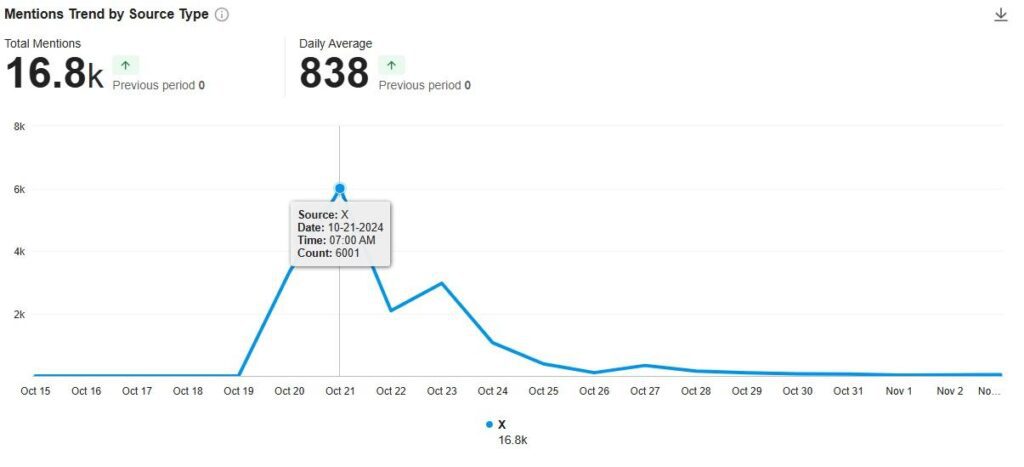
Periods of activity for the hashtag #جهاد_السلة (Basket Jihad) – Meltwater
The war displaced over 1.2 million Lebanese, according to statements by Blerta Aliko, the Resident Representative of the United Nations Development Programme (UNDP) in Lebanon, during an appearance on Al Arabiya – Al Hadath on October 31, 2024.
The UN official estimated that only around 20% of the displaced are in shelters, while the rest are living in host communities.
How did the hashtag emerge?
Syria led the geographic areas with the highest number of posts under the hashtag, recording 1,244 posts, followed by Saudi Arabia with 841 posts, the United States (445), Turkey (335), Germany (311), Iraq (287), and Lebanon (162).
On the other hand, there were 11,500 posts with unknown origins, according to Meltwater data, suggesting the possibility of inauthentic activity.
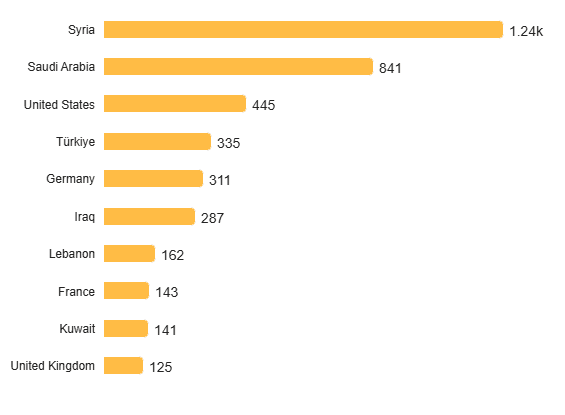
Initially, the hashtag #جهاد_السلة (Basket Jihad) gained traction through accounts affiliated with the Syrian opposition. These accounts launched the hashtag and called on users to post under it.
The first post using the hashtag came from Syrian opposition activist Majed Abdelnour (@Magedabdelnour1), as a comment on a tweet by an account named "Thulfiqar Mohammad" (@Rplebanon).
Thulfiqar’s post read:
"Those exploiting their daughters and their honor just to get an extra basket of pasta and a bottle of shampoo—what is your religion? Where is your honor, you shameless people? Keep your daughters at home... you've humiliated us."
Thulfiqar’s account has only 79 posts since its creation in 2013, with content reflecting support for Hezbollah. Abdelnour continued to engage actively with the hashtag, eventually becoming its most prolific user, contributing 219 posts.
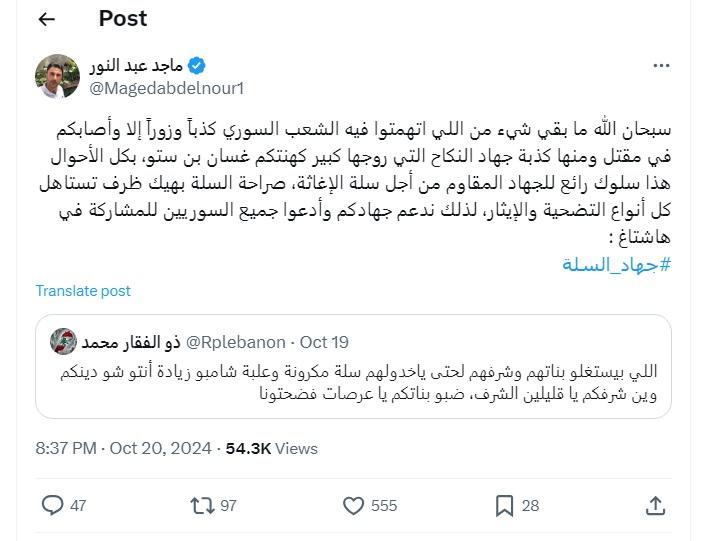
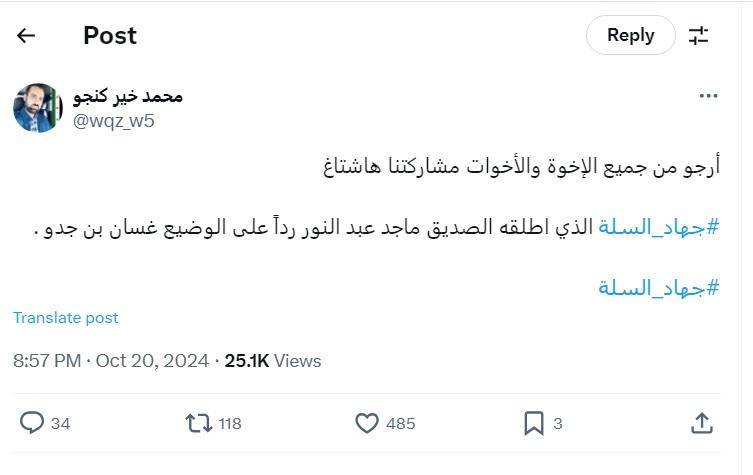
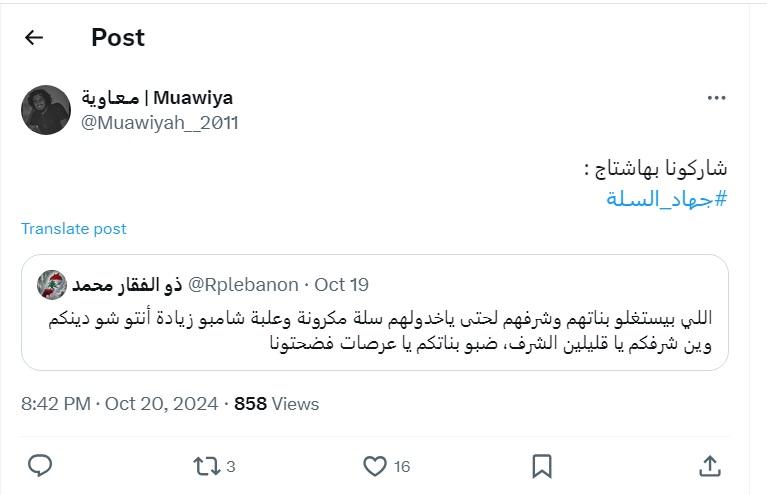
We observed interactions on the hashtag from accounts that indicators suggest are fake. These interactions were meant to amplify discussions on X, particularly in relation to Syria. An example is @Support_023 which has only a few hundred followers despite having published over 19,000 posts. The account was created in 2020 and features a retweet/repost symbol in its bio—one of the indicators of amplification accounts and inauthentic activity.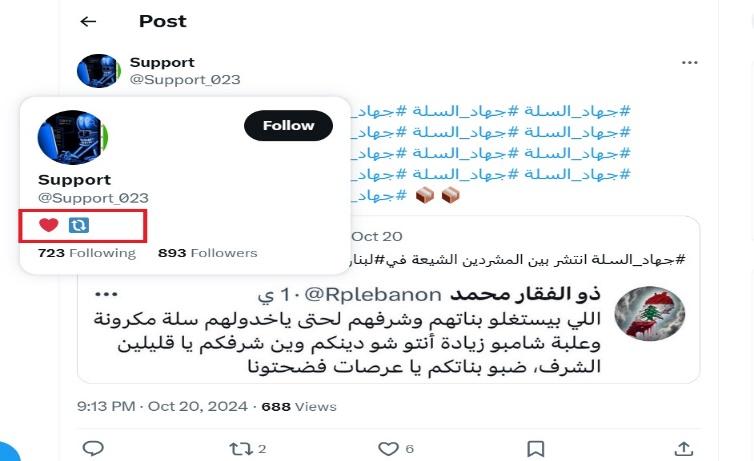
Misinformation
Participants in the hashtag #جهاد_السلة (Basket Jihad) relied on misleading information to target and defame displaced individuals from southern Lebanon. Old and new videos and fabricated narratives were circulated, alleging conflicts and altercations among the displaced or with others, often linked to sexual relationships.
For instance, the account “Jaafar” (@AboJAFFAR2020) shared a video under the hashtag on X, claiming that displaced individuals had been arrested for engaging in sexual relations. The video garnered at least one million views, despite being misleading.
When verified by Arabi Facts Hub, the video was found to be unrelated to current events in Lebanon. It actually depicted clashes between a group of Syrian men and women in the town of Biaqout, in the Mount Lebanon Governorate, and dates back to June 2024, according to the Waradana website.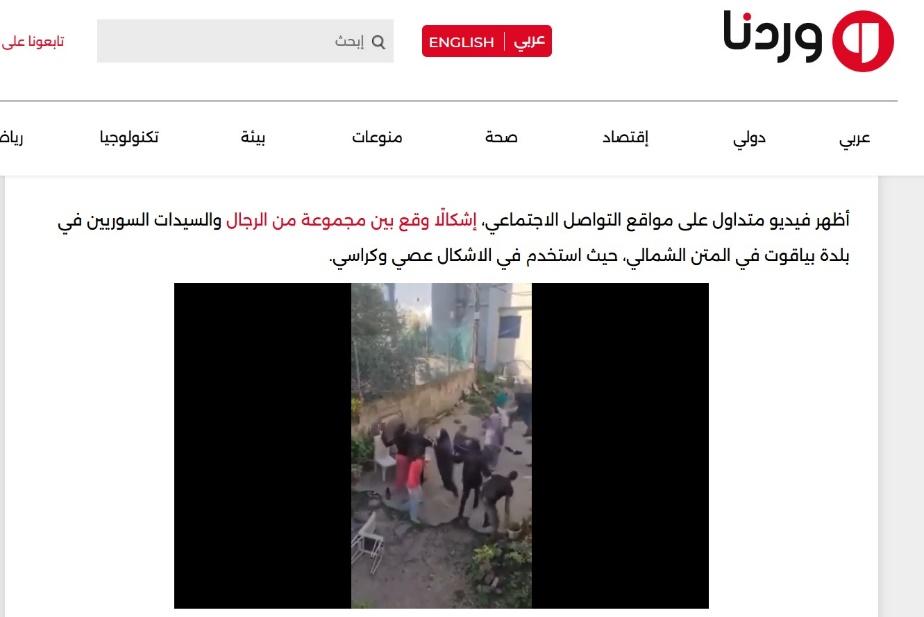
Jaafar’s account also used the hashtag to share another misleading video, claiming it depicted intimate moments between a woman and a Hezbollah member after he was injured in the Baijar explosions. However, the video was found to be unrelated to Lebanon. According to Lastly, it originated from an incident in Pakistan in September 2019, and has no connection to Lebanon.
AI-Generated Images
Recently, coordinated campaigns have increasingly relied on AI technologies, a trend evident in the #جهاد_السلة (Basket Jihad) hashtag, where AI-generated images were widely shared. These images were replicated across various campaign accounts.
Large, verified accounts on X with blue checkmarks contributed significantly to amplifying the spread of such images. The images purportedly depicted alleged interactions between Hezbollah members and female supporters of the party, suggesting they received food baskets in exchange for engaging in sexual relations.
The circulated images reveal a high level of professional effort to produce realistic and convincing scenes for the campaign.
Using tools like Poe, which hosts various AI models such as ChatGPT and Gemini, we explored the descriptive parameters potentially used to feed generative AI tools for producing the campaign images.
It appears the image creators may have provided descriptive inputs utilizing design tools to depict Muslim women wearing black hijabs—likely symbolizing women supportive of Hezbollah, who are often dressed in black. These women are portrayed standing in front of a young man holding a basket containing personal care items and groceries.
The scenes convey an air of familiarity and intimacy, strategically reinforcing the narrative behind the hashtag, which promotes the idea of "sex in exchange for food." This deliberate depiction aligns with the overarching message of the campaign.
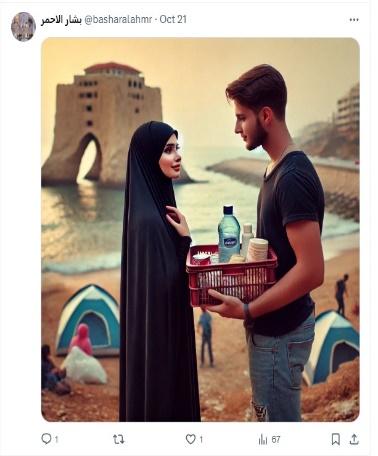
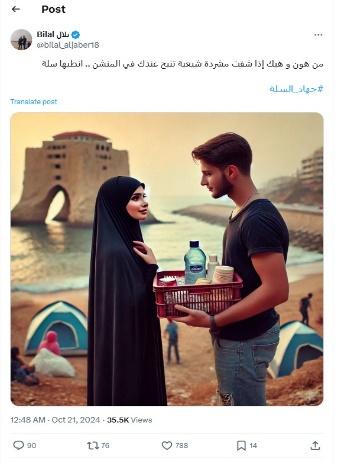
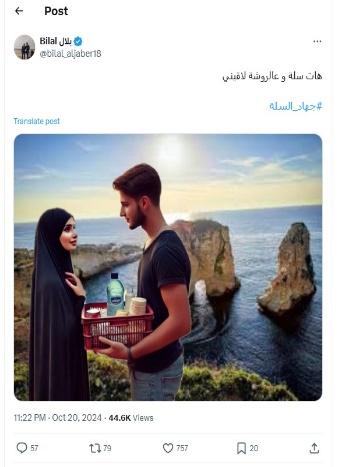
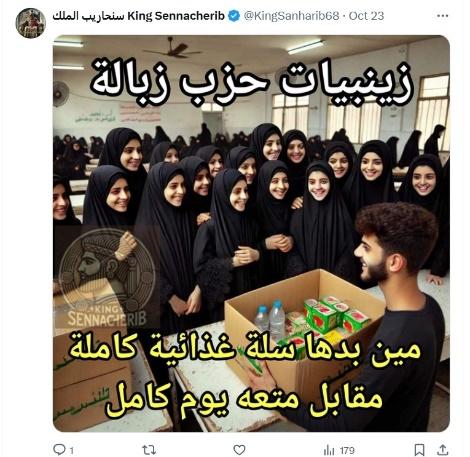
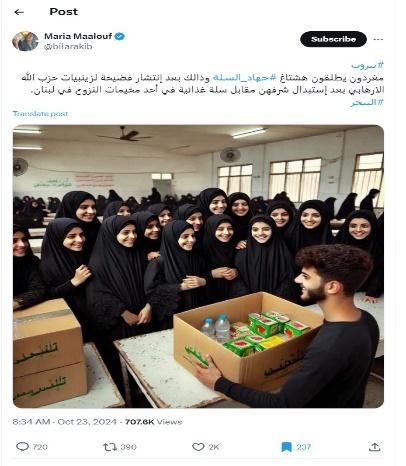
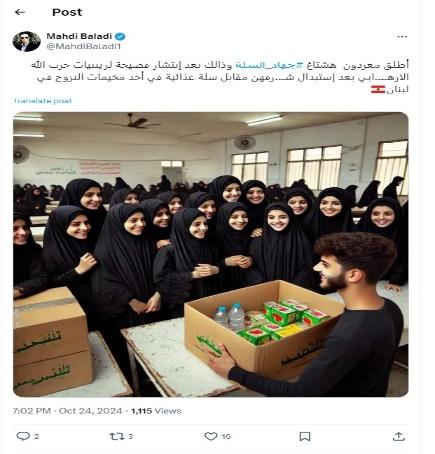
he images featured tents to evoke associations with displaced persons, accompanied by the flags of Iran and Lebanon. The phrase "Jihad al-Salla" (Basket Jihad) was written in English letters, appearing in the background of some of these images.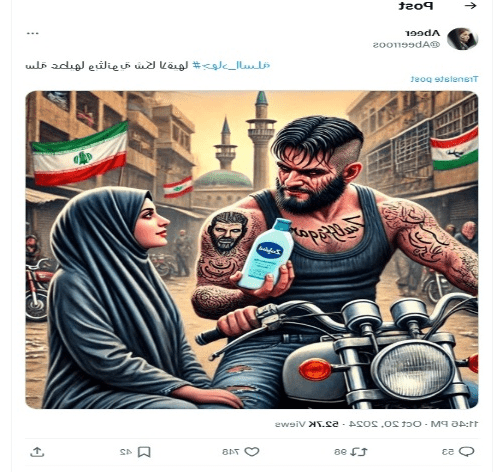
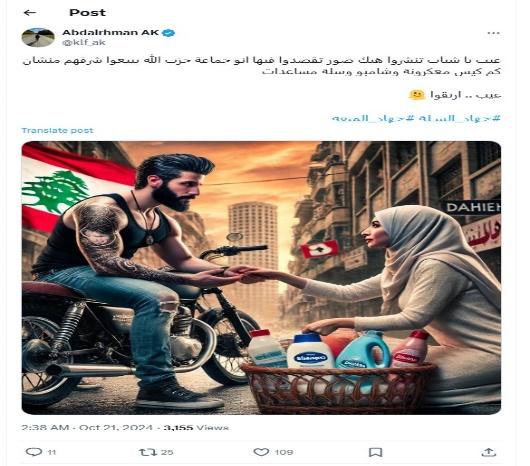
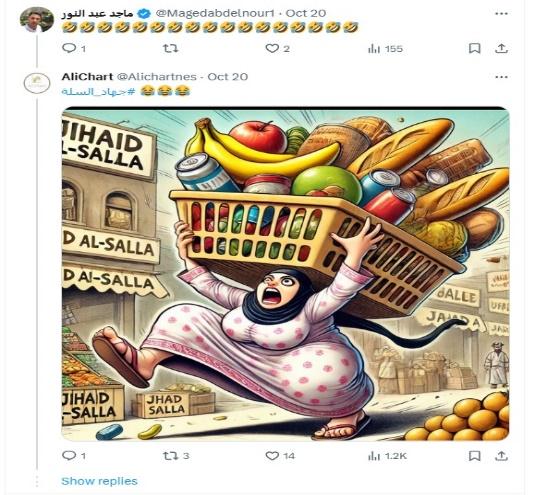
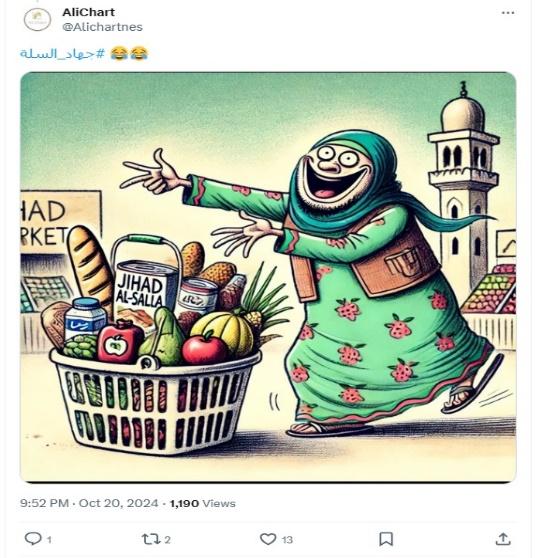
Hate Speech
Participants in the wave of posts under the campaign hashtag used sarcastic and derogatory language, promoting hate speech against displaced women and, more broadly, displaced individuals from southern Lebanon. Some posts included sexually charged terms intended to degrade women, aiming to propagate a narrative of sexual exploitation of displaced women.
The posts frequently featured offensive descriptions, such as: "whore," "prostitute," "illegitimate children," "Jihadist women of the basket," "children of the dirty environment," "peddlers of the poor," and "displaced Shia."
The spread of misinformation and hate speech violates the policies of X, yet the platform did not remove any of the campaign’s content, which continued to gain widespread attention until the publication of this report.
